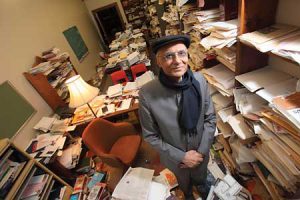
By Chris Chipello
As the world prepared to commemorate the 10th anniversary of the devastating terrorist attacks on New York’s twin towers, spiritual thinkers from around the globe gathered in Montreal Sept. 7 to reflect on religion’s potential to serve as an impetus for peace – rather than a pretext for violence.
“If religion is a part of the problem, then it can also be a part of the solution,” Arvind Sharma, Birks Professor of Comparative Religion in the Faculty of Religious Studies, told the Second Global Congress on World’s Religions after September 11.
Prof. Sharma was the lead organizer of the conference, convened at the Palais des congrès in partnership with McGill and l’Université de Montréal.
“Peace is demanding”
The Dalai Lama set the tone for the day-long event, telling a packed hall that it is wrong to denounce Islam because of the acts of a few Muslims. All religions, including Buddhism and Christianity, have “small numbers of mischievous people” among their followers, he said. While religions can be used to divide people – to create “we” and “they”– that isn’t the fault of the religions, but of the people who misuse religion.
The exiled Tibetan Buddhist leader highlighted the morning session. His discourse was followed later in the day by a panel discussion featuring thinkers representing several of the world’s major faiths.
“Peace is demanding, and we need to be courageous,” said Tariq Ramadan, professor of contemporary Islamic studies at Oxford University. “We have to speak up – for example, in the intrafaith dialogue, against people who are instrumentalizing our respective religion in a way which is not acceptable. For me, if someone is telling me that in the name of Islam he can kill innocent people, I have to stand up. It’s my moral duty to say no.’”
“It’s the same for some Christians,” he added, “when for example we see what is happening in the United States of America, with evangelist Protestants now targeting the Muslims or targeting the people and creating enemies and saying ‘this is the way to be a right Christian.’”
The need to come together
Prof. Steven Katz, Director of the Elie Wiesel Center for Judaic Studies at Boston University, said that “religions conflict for two reasons: First, every religion believes that it’s not only true, but the most true – other religious traditions are only partially true, or not true at all. Secondly, religious truth must be universal, because its source is God or ultimate reality. I would say that’s a mistake we adopted from Greek thought. But what if this is not God’s plan, or the nature of being, or ultimate reality? … What if the universal plan calls for different traditions to possess different truths and particular revelations and practices – the Koran, the Torah, the New Testament, Asian traditions? In such a case, the teachings and obligation of each tradition would remain true and binding, but they would be obligatory only for those who are members of the particular community …
“This would mean, if we were to accept it, that we would not have to kill those who disagreed with us on such matters.”
Following the panel discussion, Prof. Sharma called on the audience to endorse a resolution – carried by a show of hands – that the religions of the world should come together to formulate a Universal Declaration of Human Rights that would “embody their vision of human flourishing, and which would supplement the UN Declaration.”
